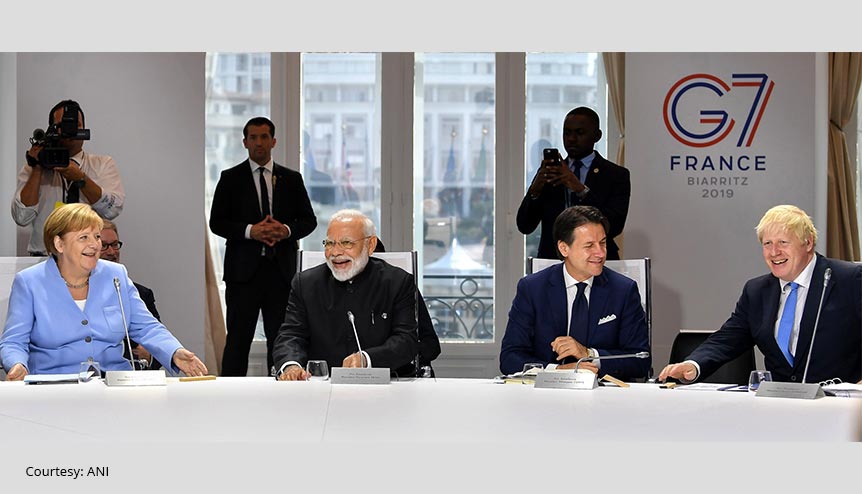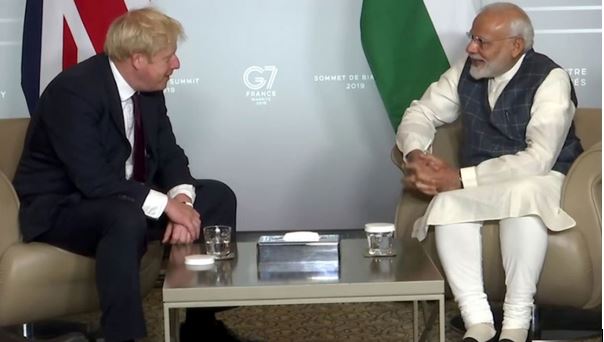The invitation had been informally extended when Prime Minister Boris Johnson spoke to the Indian Prime Minister, Narendra Modi, during phone calls late last year, but the formal communique came this weekend as India was confirmed as one of three guest nations to join the Group of Seven, or G7, at a summit presided over by the UK in June.
The G7, made up of the UK, Canada, France, Germany, Italy, Japan, the US and the European Union (EU), pitches itself as an open forum where the world’s most influential and open societies are brought together for close-knit discussions, with the pandemic set to understandably dominate this year’s deliberations. As the world’s largest democracy and an economy on an accelerated path of reforms and growth, India would therefore seem an obvious choice to join the top table of these multilateral discussions.
According to the UK Foreign Office, the invitation to India, Australia and South Korea as the three guest countries is testament to Britain’s commitment to ensuring multilateral institutions better reflect today’s world. Against this broad brush, Boris Johnson’s own ambition has been articulated as wanting to use the G7 to intensify cooperation between the world’s democratic and technologically advanced nations. Between them the leaders set to gather on the Cornish coast in south-west England between June 11 and 13 represent over 60 per cent of the people living in democracies around the world.
Pharmacy of the world
India’s pivotal role has never been more in focus, given the harsh realities faced by the world as a result of the coronavirus pandemic and its severe toll on the health of the global population and economy.
As the so-called “pharmacy of the world”, India already supplies more than 50 per cent of the world’s vaccines, and the UK and India have worked closely together throughout the pandemic in this particular area.
The UK also prides itself as the first P5 member to support a permanent United Nations Security Council (UNSC) seat for India and the first G7 member to invite India to a G7 Summit, back in 2005.
“As current BRICS President and G20 President in 2023, India will play a key role driving in multilateral cooperation helping to build back better around the world,” the Foreign Office notes.
And, it has also reaffirmed Johnson’s commitment to visit India ahead of the G7 summit in June, after a scheduled visit for Republic Day this month had to be called off due to the mounting crisis in the face of a new coronavirus variant found in the UK.

Prime Minister Narendra Modi, UK Prime Minister Boris Johnson, German Chancellor Angela Merkel in the session on ‘Biodiversity, Oceans, Climate’, at the G7 Summit, in 2019. India has been confirmed as one of three guest nations to join the G7 summit presided over by the UK in June this year, having been personally invited by Johnson.
Build back better
The UK’s mantra for the summit, the first in-person G7 meet in almost two years, has been spelled out as a means to seize the opportunity to build back better from coronavirus, uniting to make the future fairer, greener and more prosperous.
Johnson notes: “As the most prominent grouping of democratic countries, the G7 has long been the catalyst for decisive international action to tackle the greatest challenges we face. From cancelling developing world debt to our universal condemnation of Russia’s annexation of Crimea, the world has looked to the G7 to apply our shared values and diplomatic might to create a more open and prosperous planet.
“Coronavirus is doubtless the most destructive force we have seen for generations and the greatest test of the modern world order we have experienced. It is only right that we approach the challenge of building back better by uniting with a spirit of openness to create a better future.”
Ahead of the gathering of Prime Ministers and Presidents, the UK is also set to host a number of meetings throughout the year between government ministers from the G7, both virtually and in different locations across the UK. These ministerial summits will cover economic, environmental, health, trade, technology, development and foreign policy issues.
Cornwall as the location for the summit has been chosen to focus the eyes of the world on the “beautiful, historic and innovative” region. The leaders’ meeting itself will be held in the coastal town of Carbis Bay, supported by neighbouring St. Ives and other towns across the region.
In addition to the G7 Summit this year, during February the UK will assume the Presidency of the UN Security Council, and later this year the UK will host COP26 climate summit in Glasgow and a global education conference aimed at getting children in the developing world into school. (Sorce:India Global)

Readers like you, make ESHADOOT work possible. We need your support to deliver quality and positive news about India and Indian diaspora - and to keep it open for everyone. Your support is essential to continue our efforts. Every contribution, however big or small, is so valuable for our future.












India having missed becoming a UN Security Council deserves membership of GY& top table be it even on the guest role. With a population of some 1.3 billion anything related to education, health or economy plays important role in world statistics. As to now termed ‘pharmacy’ of the world – yes India has produced millions of doses of Covid vaccine and Coavaxin, India’s own has even been donated for free to some neighbouring countries as well to Brazil whose president sent his thanks to our PM Shrii Modi. Whatever the recent farmers protest India will continue to be regarded as a faithful and trusted partner by developed countries